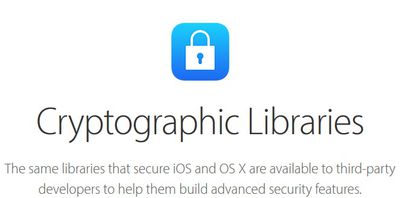Apple announced yesterday that the company has opened up its cryptographic libraries so that third-party developers can build more "advanced security features" into their apps (via VentureBeat). The cryptographic libraries being opened to developers are the same ones Apple uses to protect iOS and OS X, as Apple notes on its updated site.

Developers will have access to two of the company's advanced security features, including Security Framework and Common Crypto. Security Framework gives developers tools for organizing certificates, public and private keys, and trust policies, ensuring that all sensitive information is stored privately in a "secure repository for sensitive user data." Common Crypto library provides additional support for symmetric encryption, hash-based message authentication codes, and digests.
Both Security Framework and Common Crypto rely on the corecrypto library to provide implementations of low level cryptographic primitives. This is also the library submitted for validation of compliance with U.S. Federal Information Processing Standards (FIPS) 140-2 Level 1. Although corecrypto does not directly provide programming interfaces for developers and should not be used by iOS or OS X apps, the source code is available to allow for verification of its security characteristics and correct functioning.
Check out Apple's official website for reference sheets, service guides, and links to the open source releases for Security Framework and Common Crypto libraries.






















Top Rated Comments
Both Security Framework and Common Crypto rely on the corecrypto library to provide implementations of low level cryptographic primitives. This is also the library submitted for validation of compliance with U.S. Federal Information Processing Standards (FIPS) 140-2 Level 1. Although corecrypto does not directly provide programming interfaces for developers and should not be used by iOS or OS X apps, the source code is available to allow for verification of its security characteristics and correct functioning.
(emphasis is mine)
From what I can understand, there are no new usable libraries or API's here. OS X and iOS developers can use Apple's existing Security Framework and Common Crypto services like they have always done.
Whats new is that the source code for the CoreCrypto library that Security Framework and Common Crypto use is available. This allows developers and security professionals to better understand what the existing frameworks were already doing in the background.
One of the benefits of this release is to allow auditing of the source code, and to give assurance to developers with a "trust no one" attitude that the built-in libraries are secure and safe to use.
OpenSSL is an extremely strong proof against the idea that open source is inherently more secure. It had tremendous numbers of very serious flaws that had been in it for years. Just because people can look at the code doesn't mean that they do. That's why the OpenBSD foundation forked OpenSSL, removed tons of options, and started developing it with their audit model as LibreSSL. It's why the OpenBSD guys recently replaced sudo with a new tool called doas that has far fewer options and as a result, far less that can go wrong.
In my experience, much software developed for Linux is built on the platform because it's free and it lets the developers work very quickly. Tons of open-source code runs on Linux, so you just have to download a bunch of libraries and write glue code to get them to do what you want. Unfortunately, many don't take the time to set up their application to run properly under a non-root user account. For that matter, the recommended installation method for a lot of software now is to run curl to fetch a URL, then pipe the output to a root-level bash shell. That is literally telling your system to do whatever some web server or anything claiming to be that server tells it to do.
Certainly the average user can't read a hex dump of a closed source crypto library but many people can. So closing it just makes it harder to read, not impossible.
That said, there are systems were the executable code itself is encrypted. These are completely unreadable and I'd worry there are backdoors and whatever in there
Linux is generally regarded as the most secure platform, even though it's completely open source. Lots of people have read through the code looking for weaknesses, and lots of people have contributed fixes for any weaknesses they find.
What's different is that now, for example, they can use the open source code and be sure that there are no backdoors. If Apple has (or would be forced in the future to have) backdoors in the system, apps compiled with the open source code would be at less risk.